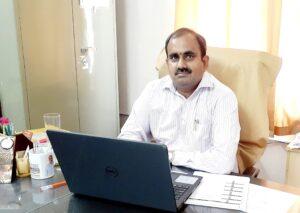Computer Science and Engineering

Dr. A. Suresh Rao
M.Tech, Ph.D. form NIT-Warangal
Head of the Department
PROGRAMs OFFERED
| S.N0. | COURSE | SPECIALIZATION | CATEGORY | DURATION | TYPE | INTAKE |
|---|---|---|---|---|---|---|
| 1 | B.TECH | COMPUTER SCIENCE & ENGINEERING | UNDER GRADUATE | 4 YEARS | FULL TIME | 360 |
| 2 | M.TECH | COMPUTER SCIENCE & ENGINEERING | POST GRADUATE | 2 YEARS | FULL TIME | 24 |
The department aims to mould the students into ethically responsible professionals having computational thinking, entrepreneurial traits and technical knowledge to conceive, design and deploy reliable computing systems for modern industry and to offer self-reliant services in research, academic arenas of science, society and technology.
M1: Strengthening the core competence in Computer Science and Engineering through analytical learning and Industry – Institute interaction.
M2: Providing exposure to latest tools and technologies in the core area to design solutions and conduct investigations.
M3: Promoting innovative research based projects / activities in the emerging areas of technology convergence.
M4: Inculcating professional behavior, strong ethical values, leadership abilities, entrepreneurship skills and commitment to lifelong learning.
Upon completion of 4 year under graduate program, the student will be able to possess the following outcomes…..
PO1: Engineering Knowledge: Apply the knowledge of mathematics, science, engineering fundamentals, and an engineering specialization to the solution of complex engineering problems.
PO2: Problem Analysis: Identify, formulate, review research literature, and analyse complex engineering problems reaching substantiated conclusions using first principles of mathematics, natural sciences, and engineering sciences.
PO3: Design/Development of solutions: Design solutions for complex engineering problems and design system components or processes that meet the specified needs with appropriate consideration for the public health and safety, and the cultural, societal, and environment considerations.
PO4: Conduct investigations of Complex Problems: Use research-based knowledge and research methods including design of experiments analysis and interpretation of data, and synthesis of the information to provide valid conclusions for complex problems.
PO5: Modern Tool Usage: create, select, and apply appropriate techniques, resources, and modern engineering and IT tools including prediction and modelling to complex engineering activities with an understanding of the limitations.
PO6: The Engineer and Society: Apply reasoning informed by the contextual knowledge to assess societal, health, safety, legal and cultural issues and the consequent responsibilities relevant to the professional engineering practice.
PO7: Environment and sustainability: Understand the impact of the professional engineering solutions in societal and environmental contexts, demonstrate the knowledge of, and need for sustainable development.
PO8: Ethics: Apply ethical principles and commit to professional ethics, responsibilities and norms of the engineering practice.
PO9: Individual Teamwork: Function effectively as an individual, and as a member or leader in diverse teams, and in multi-disciplinary settings.
PO10: Communication: Communicate effectively on complex engineering activities with the engineering community and with society, such as, being able to comprehend and write effective reports and design documentation, make effective presentations, and give and receive clear instructions.
PO11: Project Management and Finance: Demonstrate knowledge and understanding of the engineering and management principles and apply these to one’s own work, as a member and leader in a team, to manage projects and in multi-disciplinary environments.
PO12: Life-long Learning: Recognize the need for, and have the preparation and ability to engage in independent and life-long learning in the broadest context of technological change.
PSO1: Developing software applications with key focus on privacy, cost and utility.
PSO2: Storing, processing, analysing, communicating the data for effective decision-making while finding solutions for problems.
PEO1-Preparation: Develop professional skills for a successful professional career as an engineer, scientist, technocrat, administrator or an entrepreneur.
PEO2-Core Competence: Design and implement practical systems consisting of software and/or hardware components through the key principles and practices of computation, mathematics and basic principles of engineering.
PEO3-Multidisciplinary: Design and apply new ideas and technologies as the field evolves, to solve real world problems in related interdisciplinary areas.
PEO4-Professional Environment: Demonstrate professional attitude and ethics, effective communication, team work and managerial skills for societal, environmental and global context.
